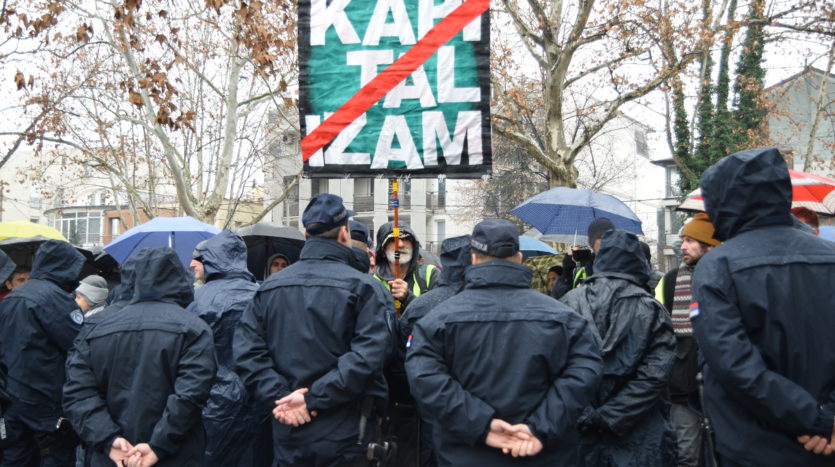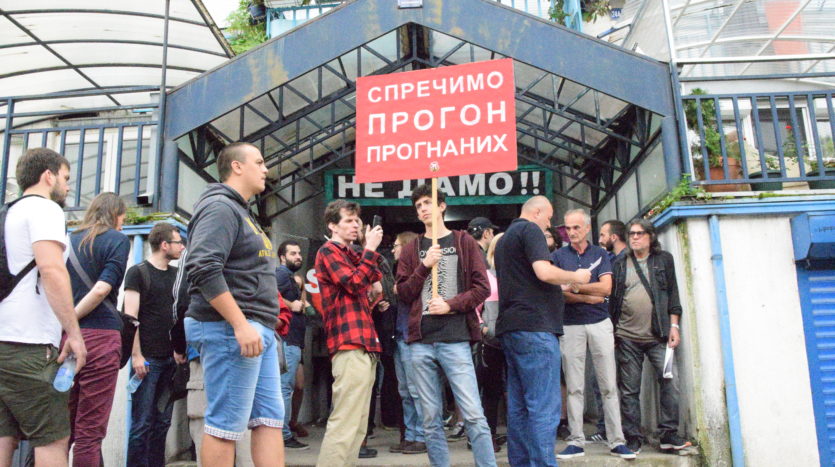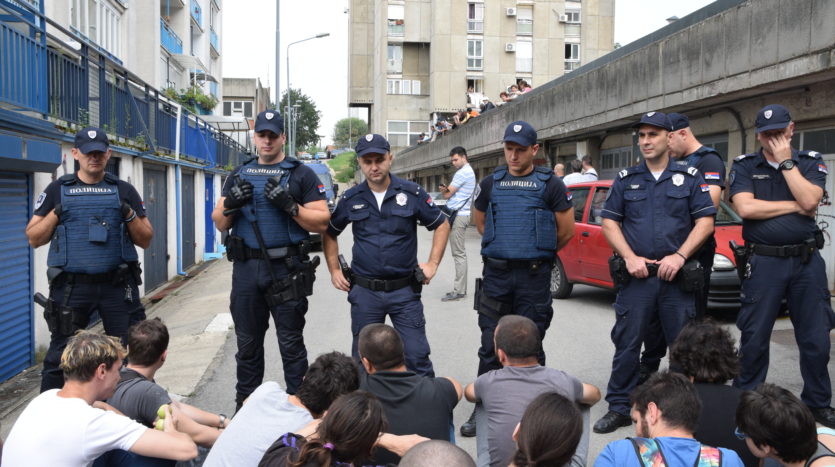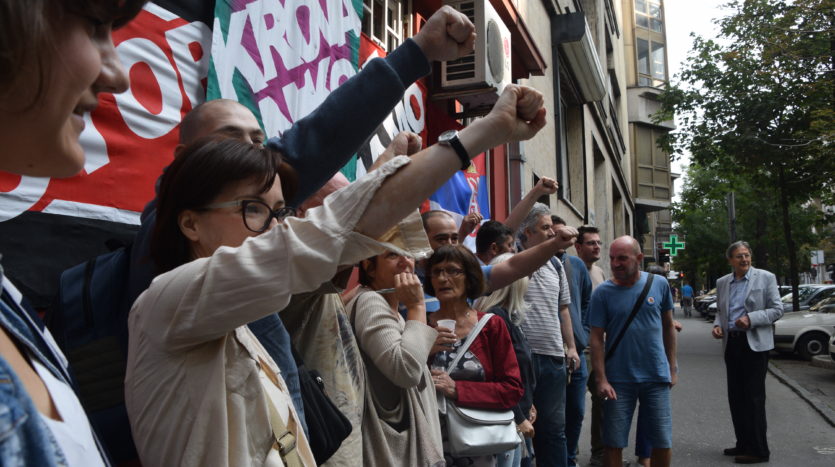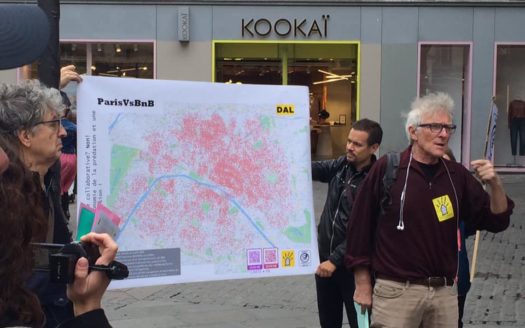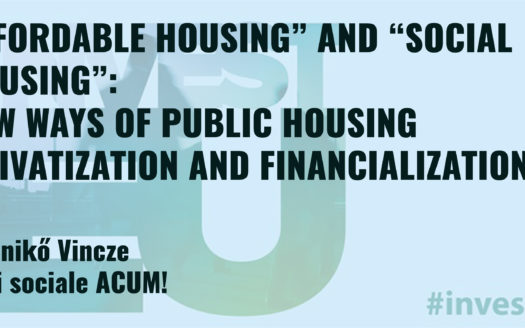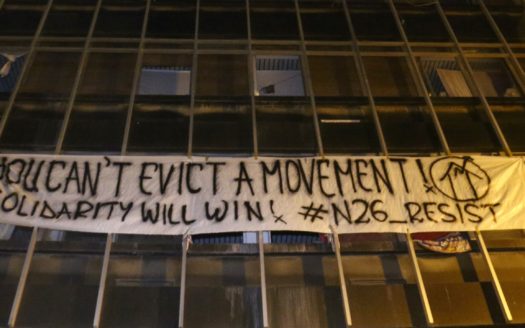Repression and criminalization of the housing movement in Serbia
From European Action Coalition Bullettin n. 4 01/2020
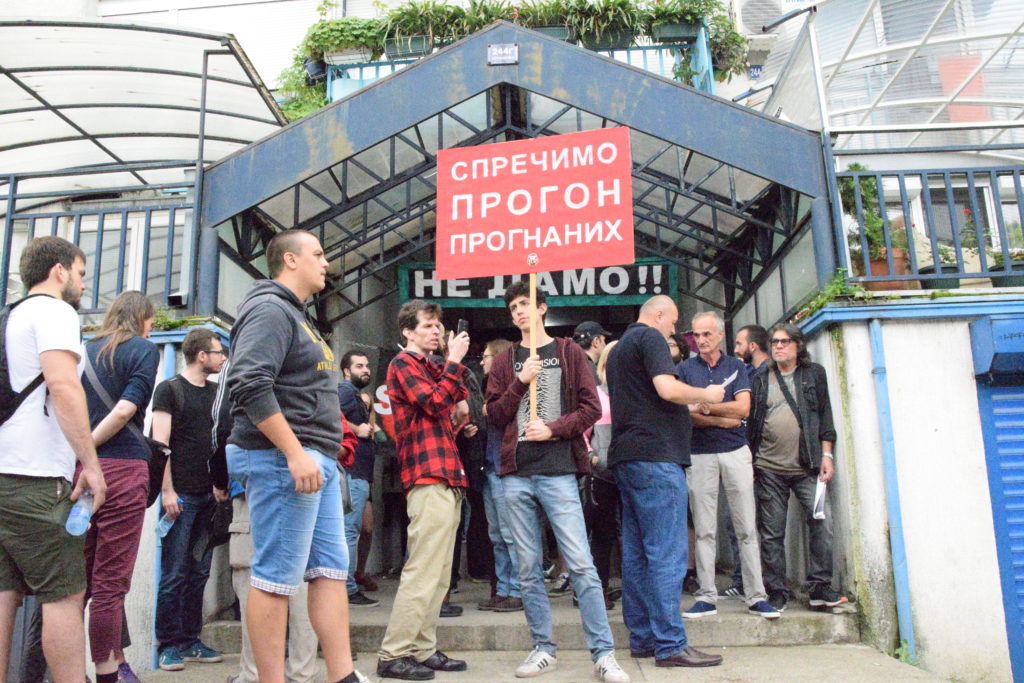
On a morning of a cold autumn day in 2017 a group of neighbors, family members and housing activists rally to a call of a family in distress. The family is locked inside their apartment, surrounded by two goons and a lawyer – representing a man who claims to be the new owner of their home. A bailiff is standing on their side, waiting for the family to sign a paper requested by the lawyer, and renounce their claim on the property. The door lock has been changed, ten policemen are in front of the door and in the courtyard preventing a group of housing activists from storming the staircase. A couple of years before, the family fell into debt towards a bank, but managed to repay the loan; the court ignored this fact, proceeded with the foreclosure, and the bailiff auctioned their flat worth 90.000 euros for 25.000.
Six hours pass, the owner of the house faints, falls to the ground and suffers an epileptic seizure lasting two hours. His wife is struggling to keep the two bulky men from carrying him away. The activists call an ambulance, the police – tired, shaken, but still following orders – won’t let them through to the door. Under a barrage of insults, threats and persuasion they cave in and let the ambulance through, the activists slip by the weary officers, and barge into the flat while the door is still open. The goons leave in a hurry, someone remembers to take the new key from the lock and hide it. Twenty people are now squatting the flat demanding that the bailiff and the police leave. The police leave and so does the lawyer. It seems that the siege is over. Two hours pass and the night falls. Someone is knocking on the door. The lawyer of the new owner, escorted by hooded thugs with clubs and metal bars, returned to finish the eviction. Seeing that people are still inside the flat, they leave after a brief exchange of threats.
The family is living in their flat up to this day, the evictions have been put on hold and they are still fighting in the justice courts for the right to their flat. The situation of the Kocić family is shared by many other families, pensioners, single mothers, workers, refugees and war veterans who are struggling against evictions in Serbia. In the past eight years, since the introduction of the system of private bailiffs and their extended power to implement foreclosures, the narrowing of the right to housing has taken on a dimension of terror over local people.
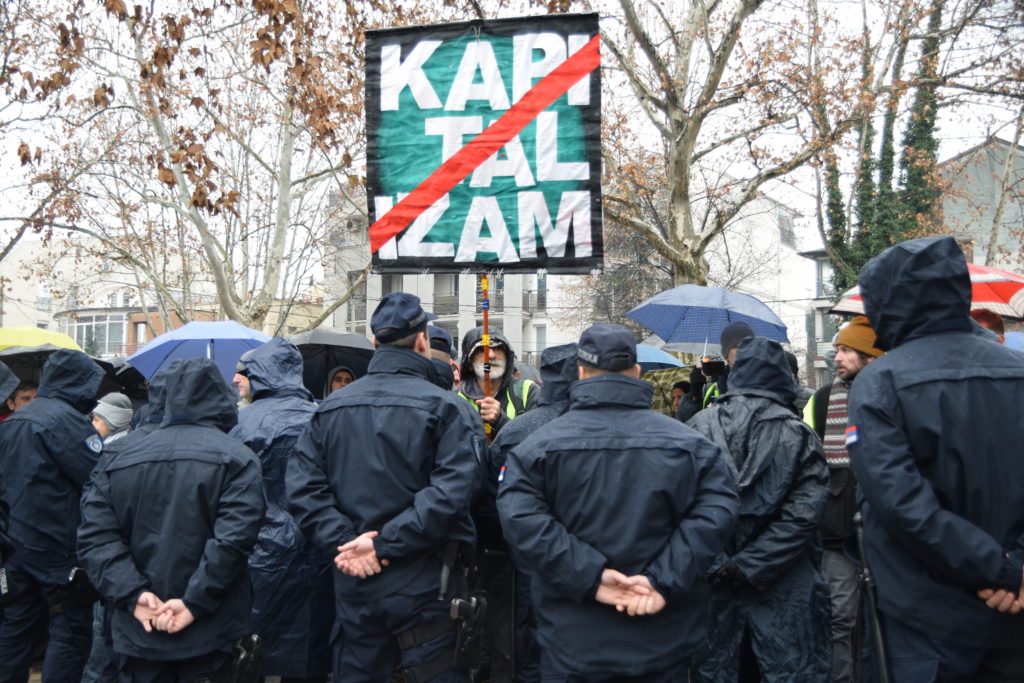
ROOTS OF THE EVICTION EPIDEMIC
Before the breakup of Yugoslavia, above 50% of all housing was “societal housing”[1] provided through monthly contributions of workers. In the early 1990s, the decision to allow public companies and state institutions to sell societal flats was motivated by the need to fill up state coffers in order to fund the war effort during the secession wars in Yugoslavia. Thus, the housing fund was abolished and all forms of state and cooperative housing provision ceased to exist. As a result of this “transition” Serbia today has a high percentage of home ownership (98%) in the property of mostly poor house owners who struggle to pay maintenance costs and utility bills.
Those who refused or missed out on the opportunity to privatize a piece of the public housing stock (due to a lack of money or good connections with the responsible authorities), were left to struggle alone on the private housing market that developed at the beginning of the new millennium. Stripped from life savings through inflation and unemployment, many were forced to get loans from speculative, mostly foreign banks that entered the Serbian market[2] and buy their homes from dodgy private investors that practiced selling the same, usually unfinished apartment, to multiple families.
The self-managed and state owned construction sector was faced with the same bleak prospects as the rest of the economy during the transition years into capitalism. Construction giants such as Trudbenik[3] and Komgrap that provided high quality flats on a mass scale were privatized and then went bankrupt. Over 800.000 refugees (Serbs and Roma) fled from neighbouring states to Serbia during the wars in Croatia, Bosnia and Kosovo. Since the state stopped investing in social housing many of the refugees still live in improvised collective housing centres. Under these circumstances home ceased to be a place of refuge from the hardships of life and became another battleground of class struggle.
In Serbia, in order to access credit, an individual needs to guarantee for the debt with his/her entire property, often representing their only home. In a country of unregulated, low paid labor where 25% of the population lives on the brink of poverty and 7.2% lives in extreme poverty, their home has become the only possible asset for debt collection.
The eviction epidemic started with the privatization of the eviction system in 2011. Through legislative changes, the state introduced private bailiffs as a supposed solution to the problem of “inefficient enforcement” of court verdicts – previously done by public court bailiffs. This reform was adopted by the ruling center-right Democratic Party’s government under pressure from the European Union. While the narrative designed for the general public was that the private bailiffs would provide working people with a quick way to collect their salary debts the reality fell short of this promise. Instead of workers from privatized and ruined factories being able to claim their redundancy pay and wages, the law only accelerated the demise of the already impoverished working class. Justice became accessible only to those who were able to pay the bailiff fee. The new enforcement system provided banks, loan sharks, utility companies, corporations and wealthy tycoons with an additional tool for the dispossession of poor and indebted members of society.
The organization of the bailiffs’ work implies their personal interest in the enforcement process. Since bailiffs have the power to decide how the debt will be repaid it often happens that they choose to sell a flat for a small debt of a couple of thousands of euros. The bailiff is the one who assesses the value of the property and also the one who sells it, while he/she keeps a hefty commission. Since their services are expensive, they remain unaffordable for working class people. Flats and houses are sold at auctions that are often organized in obscure places[4] far away from the place of living of those whose homes have been sold. Homes are often sold at prices many times lower than there have been cases where buyers have been other bailiffs, their relatives or people close to them. Other buyers are wealthy individuals, banks and loan sharks. People’s misery doesn’t end with their flat having been sold. The debtor is required to pay the enforcement fee for being kicked out of his/her own flat. At the end of 2017, a single mother was thrown out of a flat that she bought but lost when it was restituted to a previous (pre-war/pre-nationalization) owner. A bailiff who grossed 800.000 euros that year alone, charged them 11.000 euros for the cost of her enforcement “services”.
Bailiffs are assisted by the police or private security firms. The act of forced eviction involves the forced removal of people from their homes and communities, frequent aggressive behavior and intimidation by the bailiffs, the police and private security. More than once, social service workers threatened mothers to take away their children if they failed to comply with eviction orders. In late 2018, a man’s dog was euthanized on the spot when the bailiff came to evaluate his property while he wasn’t home. In Serbia, the State has no obligation to protect the evicted. The institution of emergency accommodation has been abolished, and there is no housing support for the homeless.
With the legislative changes that came into force in 2016, private bailiffs were renamed “public bailiffs” to hide the true nature of their work. Control over the bailiffs was transferred from courts to the bailiffs themselves – since then, complaints about fraud and irregularities are to be submitted to the ones that perpetrated them. This cartel of 215 individuals now called “public bailiffs” established a racket through which they ruthlessly enforce debts with the assistance of the police. In addition to acting on court decisions, bailiffs also act on so-called “credible documents” from creditors (such as utility or phone company bills and debts towards banks), without prior court verdicts. At the beginning of 2019, bailiffs were tasked with enforcing more than 300.000 individual cases of debt in a country of six million inhabitants.
Today, the repayment of debt has become paramount and nothing delays enforcement – it can be done from dawn till dusk, under extreme weather, during holidays, and without taking health and socio-economic status of the people being evicted into account. Together with their homes people often lose their furniture and family heirlooms which are auctioned off. Public bailiffs also confiscate up to two thirds of debtors salaries and pensions. There have been cases of illegal confiscation of social benefits and alimonies.
The privatization of the bailiff system, aimed at dismantling the so-called “debtors lobby”, gave rise to a new stratum of the middle class that is profiteering from the bailiff system – bailiffs, sales agents and auction hosts, moving companies, better-off buyers, locksmith and private security firm owners. The debt enforcement continues even when irregularities or frauds have been identified in the court – nothing delays the swift hand of the so-called justice of the capitalist state.
In 2017 alone, 3736 real estate seizures were carried out, according to the Chamber of Bailiffs, while the daily newspapers Politika states that more than 3000 families have been evicted from their apartments in the last seven years. Homelessness is being produced at the same rate of new housing blocks. The capital of Belgrade alone has 698.811 flats out of which 107.474 (15.49%) are uninhabited, while this percentage in other cities is around 20% – in a country that is the European champion in terms of overcrowded housing with around 55% of overcrowded households.
Empty flats and houses shrink the supply on the real estate market which results in the rise of rent for tenants and home prices for potential owners, while benefiting landlords, investors and banks. In essence, stark contradictions in the housing sector reveal the utter absurdity of capitalist relations which produce wealth for the purpose of bolstering portfolios and abstract growth while neglecting the needs of the people whom this wealth should serve.
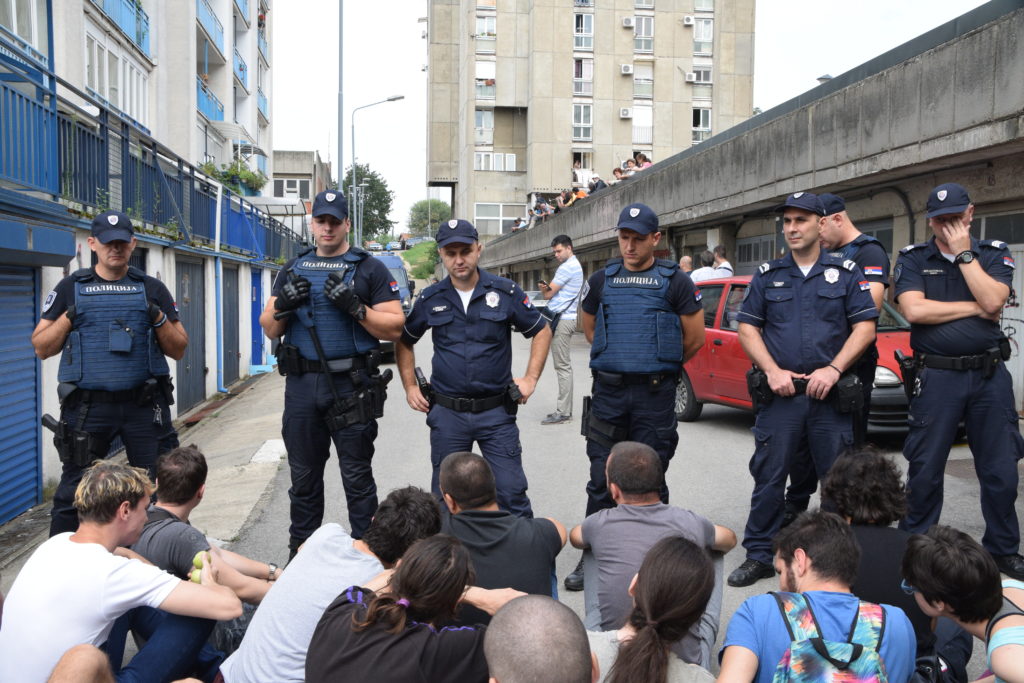
GROWING REPRESSION ON THE HOUSING MOVEMENT
At the beginning of 2017, the Roof was founded by several left wing organizations and individuals. Through community organizing, advocacy work, research, awareness campaigns, protests, bank occupations and more than a hundred anti-eviction actions, the organization has played a crucial role in shifting the ideological paradigm – evictions are no longer viewed as private affairs of indebted individuals, but as illegitimate dispossession of ordinary people by the rich, that must be resisted. More and more people that are struggling with housing problems are joining the movement. The main goal of the Roof is to struggle for a society where no one will be homeless, a society where the right to a home is guaranteed.
Solidarity and self-organization of people in the street has been growing. Neighbors and work colleagues are getting increasingly involved in anti-eviction actions and the state is pressuring the movement. As of now, members of the organization are faced with more than 20 individual criminal charges for obstructing police – each carrying a potential prison sentence from one to three years.
In April 2019 the police took into custody 17 activist of the Roof who gathered in solidarity with Mandić family in Novi Sad. Mandić family invested 40.000 EUR in a joint construction effort together with another family who owned the land. They gave the money in advance, without a written contract, counting on the verbal agreement. Instead of honoring the agreement the landowners took the money and filed a lawsuit against Mandić family. Without a written proof that they gave the money to the landowners Mandić family lost the case and were evicted from the half-finished house.
Another mass arrest took place in summer 2018 when police surrounded a building where 22 refugees from Kosovo, Bosnia and Croatia were occupying empty flats for the last ten years. The Commissariat for Refugees was determined to evict them. Activists charged the police line and managed to break through to the building and block the entrance. They were all rounded up and sent to the police station. Thanks to the heroic efforts that were televised, the eviction was canceled and the Commissariat agreed to negotiate.
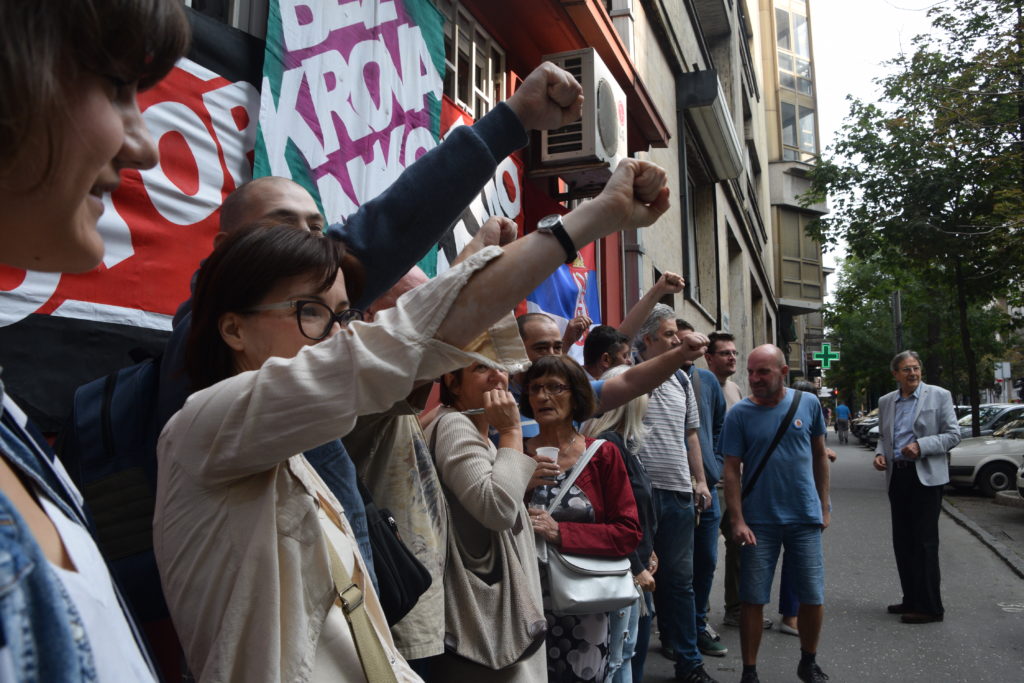
In June two activists of the Roof were attacked and brutally beaten on the university campus by two masked men. The same attackers have been noticed plastering “Serbian Right” posters on the campus. The “Serbian Right” is a rightwing proxy party of the ruling Serbian Progressive Party and does its dirty jobs. This attack best reveals the reactionary role of the various right-wing organizations which are under the direct control of the regime. They serve as a tool for dealing with people who are fighting for a better and just society. This attack is an example of increased repression and the determination of the state to criminalize solidarity by all means necessary.
After two years of intensive street mobilizations and anti-eviction struggles, the government reacted to the mounting pressure by changing the Law on enforcement. The law was drafted with the support of the EU, USAID and the Council of foreign investors, without the participation of the Roof and the public, and without prior public debate, quickly voted through Parliament during the summer of 2019.
Instead of addressing pressing grievances with the current system of evictions, the state criminalized solidarity by implementing fines and prison sentences for “eviction obstruction”. When the law comes into force, even filming an eviction procedure will be deemed as “obstruction of the eviction process” and land you in prison. The law also ramped up eviction costs as a way of discouraging people from resisting. This is a clear indication that the state stood up for the protection of the bailiffs’ and unscrupulous creditors’ interests.
In June 2019, as an attempt to pressure the law makers, the Roof organized a public protest. The rally, with the main slogan “No one without a home, a home for all – now!”, began with a minute of silence for Ljubica Stajić, who had committed suicide a few days before by setting her apartment on fire. Several days later, activists of the Roof protested outside the European Union embassy in Serbia and demanded a meeting with the European delegation chief – since EU institutions have been supporting the implementation of the law on enforcement. The EU had praised the results of the bailiffs in its report on the progress of Serbia in EU integration, and had secretly funded and organized so-called round table discussions about the law that had been closed for the general public. The European Delegation avoided a meeting with activists of the Roof in which the question of the EU’s responsibility in the process of passing this criminal law was to be raised.
Thanks to the pressure from organized resistance, evictions became difficult to ignore as more and more people choose to defend their homes by seeking help in their communities instead of giving up. The struggle is spreading from the capital to other cities, towns and villages, a new nationwide movement for the right of housing is within sight. What has changed in the last two years is that the dispossessed are no longer left to their own means.
Ana Vilenica and Nemanja Pantović
ZA Krov nad glavom [The Roof]
*This text was first published for ROAR magazine’ in the end
[1] Unlike in other socialist states in which the state played a key role in providing housing, the Yugoslav model of self-managed socialism left the role of investment in housing to individual companies and workers who deducted approximately 4% of their monthly wage to the housing fund from which the investment in flats was financed. That is why the term “societal housing” has been introduced, since it describes the housing system in Yugoslavia before the break-up with more accuracy.
[2] Official statistics state that today only 5% of people have enough assets to buy real estate on their own.
[3] A couple of hundred workers from Trudbenik still live in barracks at a worn-down collective housing facility built to house workers. The entire street was privatized in 2009 together with the
company, workers were left stranded and are now fending off eviction attempts. The Roof helped organize a solidarity festival in the neighbourhood and opened the Workers museum Trudbenik in an abandoned workers hotel as a way of supporting the struggle.
[4] One of the most infamous cases was that of Branka Hawatmi whose flat was sold at an auction that took place in a butcher’s shop in a small village near Belgrade without her being informed about it.


